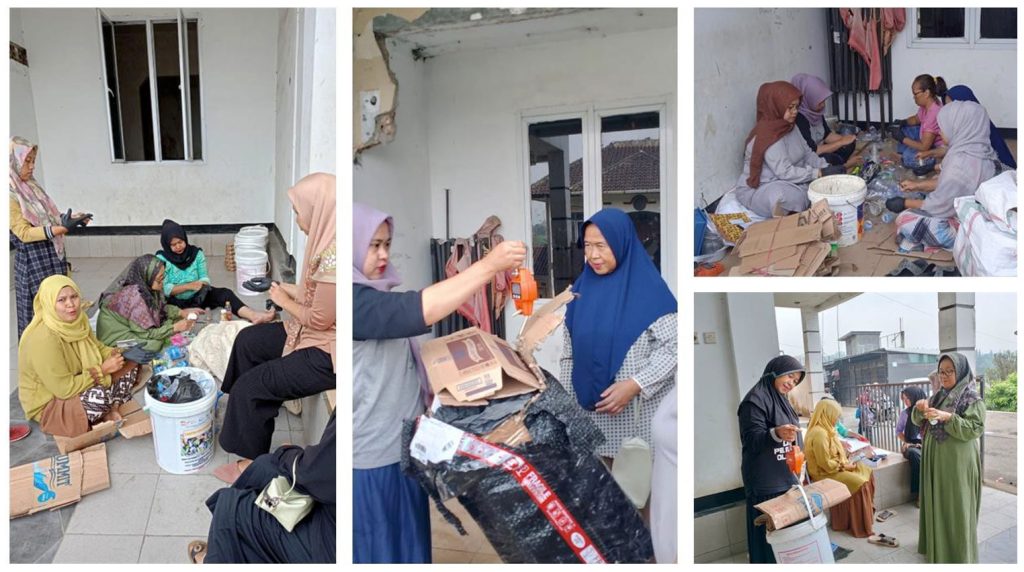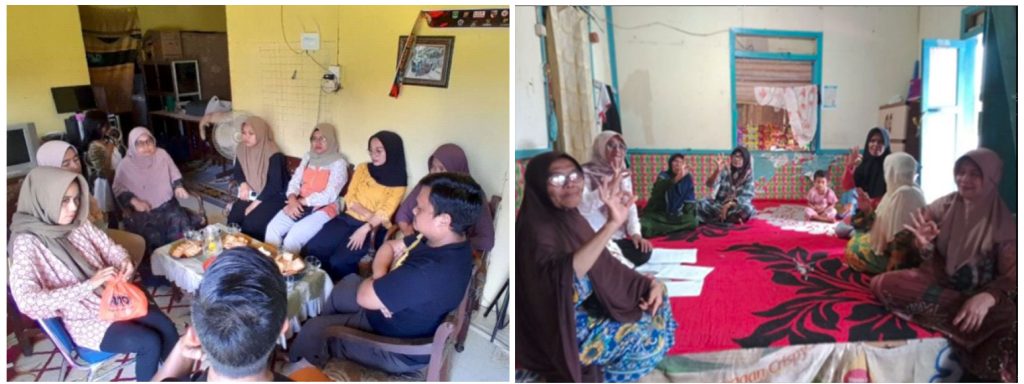Indonesia’s battle against waste has a powerful and potential warriors: its women. Beyond the endeavor of fighting against waste lies a growing movement, where female hands are weaving a cleaner future. Their involvement in waste management is not just a statistic; it’s a force potentially transforming performance and paving the way for a more sustainable tomorrow. Traditional gender roles often limit women’s access to resources and decision-making in formal waste management. Yet, their potential remains untapped – a reservoir of innovation and community engagement waiting to be harnessed.
The shadow of confined access within the sector
ERiC- DKTI, which works in 6 municipalities, finds the issue of women’s involvement as an important aspect that needs to be addressed. Baselines conducted in each region say it all that women are still the parties that are less considered. In this case, women’s access to resources and decision-making in formal waste management is still very limited across all target locations. Women twirl with both grace and grit. On the one hand, it necessitates grappling with deeply entrenched societal norms and gender biases that relegate women to specific roles. The relegation effectively excludes them from training, resources, and leadership opportunities within formal waste management structures.
Another shadow whispers in the informal sector, where women, often like invisible threads, bend their backs to collect waste. They face hazards that impact on their health, exploitation that mute their voice, and a lack of recognition that overshadows their contribution. Additionally, the shadow of power looms large, where unequal access to resources and decision-making leave women’s voices muted. Like trying to speak through a thick curtain, their ideas struggle to be heard and their policies are difficult to take root. The weight of this inequality can stifle even the mightiest changemaker.
Started in 2021, ERiC-DKTI projects initiated the intervention across 6 locations with one of the aims to increase public awareness & participation to manage waste through community-based waste treatment facilities (waste bank and temporary waste storage facilities/TPS3R) and improve its management system. The program embarked on various activities ranging from awareness raising of waste sorting at the source, waste source management, piloting, SOP (standard operating system) and management improvement for the community-based waste treatment facilities, and waste value chain creation.
The women influence as a catalyst for change
The pilot results indicate that the implemented intervention has yielded positive impacts on pivotal facets associated with community waste management and, more specifically, the management of waste storage facilities. Notably, following the execution of pilot activities, favorable conditions witnessed a discernible enhancement. Stakeholders engaged in the initiative demonstrated an effective expansion of the coverage of community-based waste treatment facilities services, increased institutional activity, heightened community willingness, and augmented awareness regarding waste segregation at the source. Additionally, the integration of community-based waste treatment facilitiesschemes and the implementation of region-specific incentive schemes were observed, indicating a contextually relevant approach to waste management practices within each region.
Within Jambi City, for instance, advancements were observed in the better operations of TPS3R. The improvements include a 46% expansion in customer service coverage, the establishment of a regular composting regimen, successful integration of informal waste pickers into the TPS3R institution, and enhanced functionality of community-based waste treatment operations. Furthermore, TPS3R exhibited a substantial increase in compost production, escalating from 0.08 tons to 0.45 tons. Waste segregation endeavors also realized success, with the volume rising from 0.8 tons to 1.9 tons. Improvements were additionally recorded in the management and efficacy of the novel incentive scheme tailored for TPS3R customers, reflecting an encouraging evolution in operational strategies.

The notable aspect discerned from the success lies in the extensive participation and substantial contribution of women across nearly all facets of the pilot activities. From awareness campaigns and community education to waste segregation implementation and the fortification of TPS3R/Waste bank institutions, women emerge prominently as determinants. Specifically, 70% of the 254 individuals engaged in TPS3R/Waste Bank activities are women, a demographic reflection of their predominant role in domestic responsibilities, positioning them as primary actors in waste management compared to their male counterparts. Women’s significant contributions are further evident in the success of waste awareness campaigns and education, with 60% of advocates/cadres being women. Additionally, in composting initiatives, the Women Farmers Association utilized women- produced compost, amounting to 40 kg per month. This inevitably underscores the noteworthy contribution of women in sustainable waste management practices.
In the case above, community-based waste management initiatives, guided by the resilience and dedication of women’s groups, have become the driving force behind increased waste collection rates. Reports across 6 regions reveal that these grassroots efforts, led by women, outshine formal waste management services, showcasing higher rates of waste collection and a community united in their commitment to a cleaner environment. In certain instances, within these pilot initiatives, women assumed leadership roles—an uncommon occurrence, given the prevailing male dominance in leadership positions. The communities, influenced by the leadership exhibited by women, wholeheartedly adopted the approach, resulting in elevated rates of waste collection.

Unveiling women potential in the future
These narratives coalesce to delineate a narrative of positive correlation, wherein the engagement of women in waste management initiatives extends beyond mere statistical representation. It unfolds as a narrative of empowered communities, sustainable practices, and the unwavering commitment of women steering the course of waste management in Indonesia.
The results of pilot measures by the project have informed the extent to which women assume a transformative role by leveraging their social networks for community engagement. Their leadership serves as a catalyst in cases across 6 regions of the pilot measures, mobilizing communities and engendering heightened levels of participation and compliance.
Meanwhile, the story of Jambi city illuminates the power of women in confronting with resource constraints. In such cases, women in Jambi city (and in the other pilot regions) demonstrate resourcefulness, steering great initiatives of waste collection, upcycling projects, and composting practices. Transitioning towards sustainability, the advocacy of women for responsible waste disposal presents a value that merits broader policy consideration. Their commitment to championing composting and resource recovery represents a commendable endeavor. Unfortunately, the contributions of women remain confined to a limited scope, hindered by the absence of encouragement from authorities or women supported public policy. The potential impact of women’s contributions could be significantly amplified if avenues for involvement were expanded to higher levels, such as regional planning and decision-making processes. This aspect is a factor worth considering in the coming stage if the potential of women in waste management in the region becomes real potential to materialize.
Link to Further Materials
Emission reductions through improved waste management infrastructures – giz.de
Contact Person
Makhdonal Anwar
Key Buzzwords
Women empowerment, waste management, sustainable practices, grassroot, community-based solutions, Indonesia.
